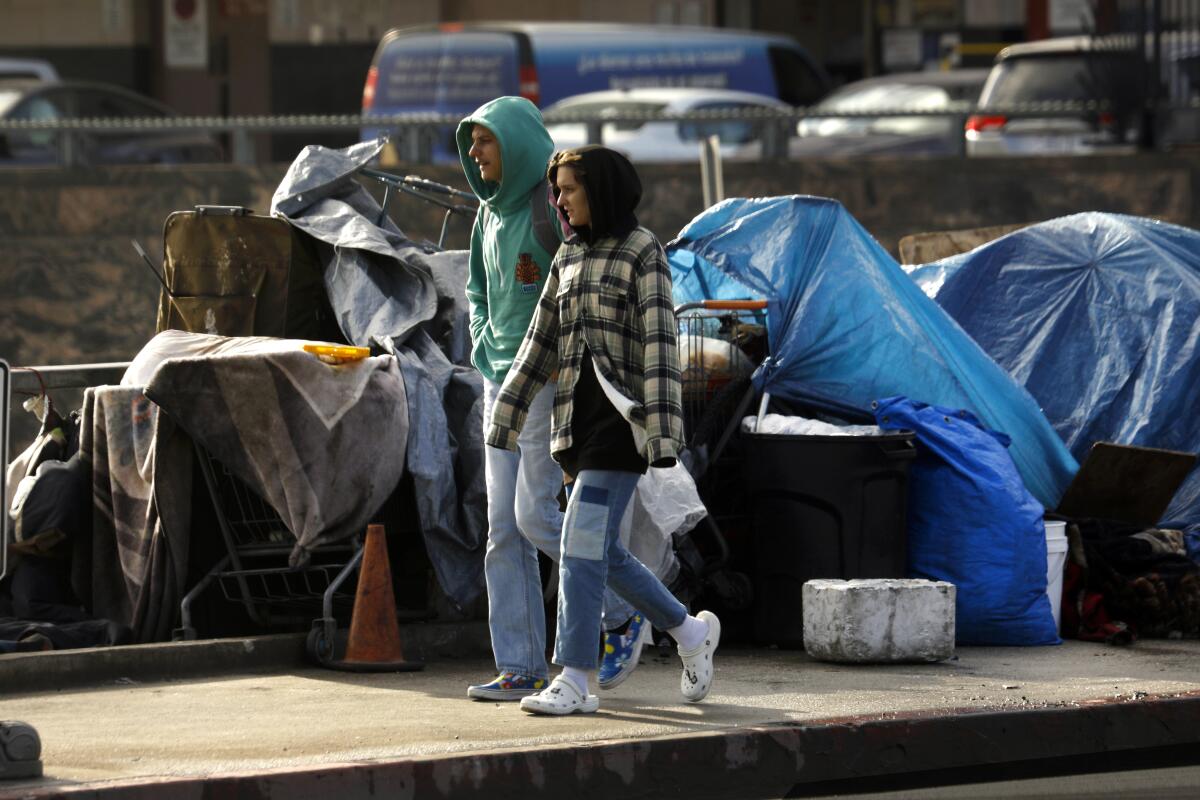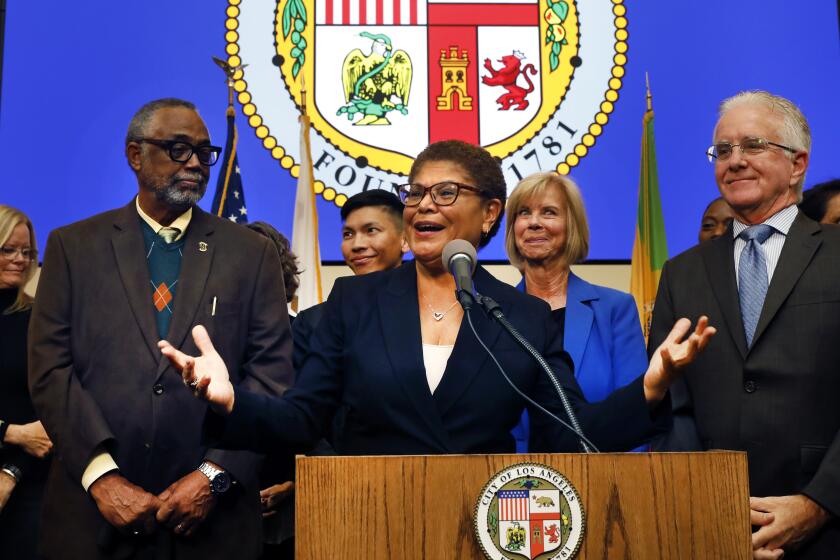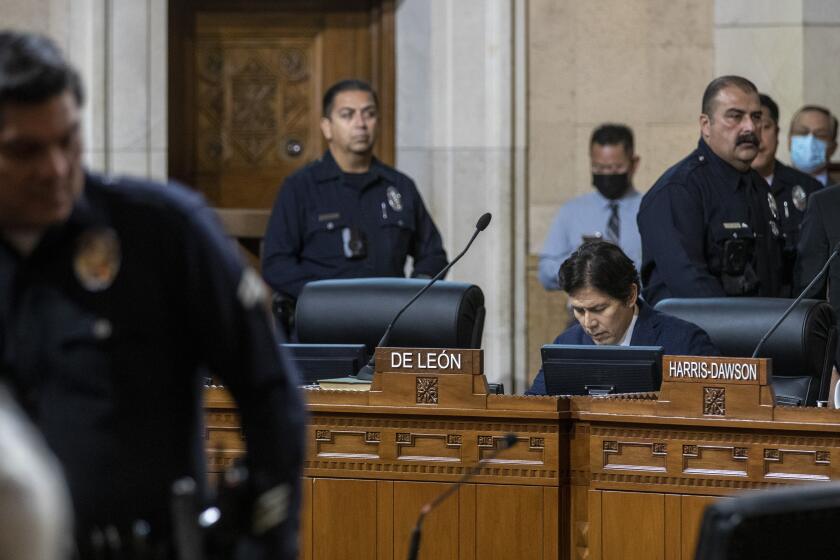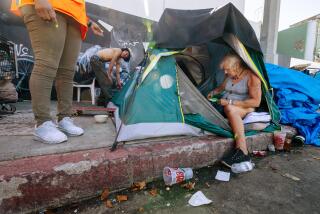Bass issues sweeping directive to fast track affordable housing projects

Closing out her first workweek in office, Los Angeles Mayor Karen Bass issued a sweeping directive Friday requiring city departments to rid their procedures of the bottlenecks that slow development of affordable housing and shelters.
Bass’ first executive directive instructs the departments responsible for processing affordable housing and shelter applications to complete all reviews within 60 days. Such reviews typically take six to nine months, city officials said.
Another key element waives discretionary reviews on projects that do not require zoning changes. Currently those reviews, which can include public hearings and additional environmental reports, are required on all projects of 50 units or more. To avoid those reviews, developers have often planned projects of 49 units when the zoning would have allowed more.
City officials said 31 projects currently in the review process would receive relief under the orders.
Bass’ announcement signals her efforts to make good on her campaign promise to bring urgency to the homelessness crisis. The directive comes days after she declared a state of emergency on homelessness.
“With this executive directive, we accelerate and lower the cost of affordable and temporary housing to bring people inside and keep people in their homes,” Bass said. “It is now time to get to work.”
An emergency order gives L.A. Mayor Karen Bass the power and flexibility in responding to the homelessness crisis. It’s up to her how big she’ll go.
The orders, which apply only to projects for 100% affordable housing, address the complaints of developers who say their projects languish for weeks or months while plans are reviewed and then face delays in construction waiting for inspections.
Bass signed the order at a dirt lot in Boyle Heights where an affordable housing development is under construction.
Bass said that she hopes the loosened rules encourage developers to build larger projects, noting that some construct buildings to get around the city review process.
“I have a big smile on my face right now,” said Deborah La Franchi, founder and chief executive of SDS Capital Group, an investment management firm that raises private capital to fund supportive housing. “It’s going to make such a difference on getting these units built and moving tenants into them.”
The directive also instructs departments to conduct their reviews simultaneously, so applicants would no longer have to submit their plans for multiple reviews one after another.
“That’s going to make a tremendous difference to have that early coordination between the different departments when they’re reviewing the projects,” La Franchi said.
More than 40,000 individuals are homeless in L.A., and Bass faces enormous pressure to get people indoors and housed.
Miguel Santana, president and chief executive of the Weingart Foundation, said the streamlining of the city process will be critical as hundreds of millions of dollars for affordable housing begins to flow from Measure ULA, the tax on high-value real estate deals approved by voters in November.
“With ULA around the corner, it makes it clear there is going to be a special door, a special treatment for affordable housing,” Santana said.
Santana conceded that issuing a directive is only the first step.
“Just saying it doesn’t make it so,” he said. “There has to be an organizational structure around it. It does set a clear directive and mandate from the CEO of the city — the mayor — to every general manager who touches affordable housing that this is the highest priority and must be treated with urgency.”
“This type of action is what’s needed to make a material impact on affordable housing development in Los Angeles,” said Gray Lusk, chief operating officer of SoLa Impact, a private developer of affordable housing. “But she has her hands full getting this implemented with the bureaucracy of several city departments, and I think she is going to have to ‘break a few eggs’ over there to make this omelette.”
Bass’ focus on expediting reviews of affordable housing will bump into the reality of city staffing shortages. During the height of the pandemic, the city offered a retirement incentive package to cut costs and many departments remain understaffed. The Planning Department, for instance, has a 27% staff vacancy rate.
Council members backed the mayor’s homelessness proposal even though some had threatened to walk out if Councilmember Kevin de León returned. He voted from a back room.
Bass could also face criticism for not going farther in waiving approvals. Developers seeking to build larger projects than what the city allows, for instance, will still have to go through a lengthy review process.
Mercedes Márquez, L.A. chief of housing and homelessness solutions, said that there’s a difference between “bureaucracy and red tape” and “legitimate planning concerns and land uses.”
“Our General Plan is a law. And so we’re not going to be doing that without a review,” Márquez said. “The important part is that we have flattened the discretion. Agencies have to get through this process.”
Friday’s news event was held at the construction site of the long-delayed Lorena Plaza housing project. Dora Gallo, chief executive of A Community of Friends, which is developing the project, said the new directive wouldn’t affect Lorena Plaza because it is already being built.
But she called the executive directive a “momentous occasion” that will change how the city manages its affordable-housing and supportive-housing development process.
More to Read
Sign up for Essential California
The most important California stories and recommendations in your inbox every morning.
You may occasionally receive promotional content from the Los Angeles Times.














